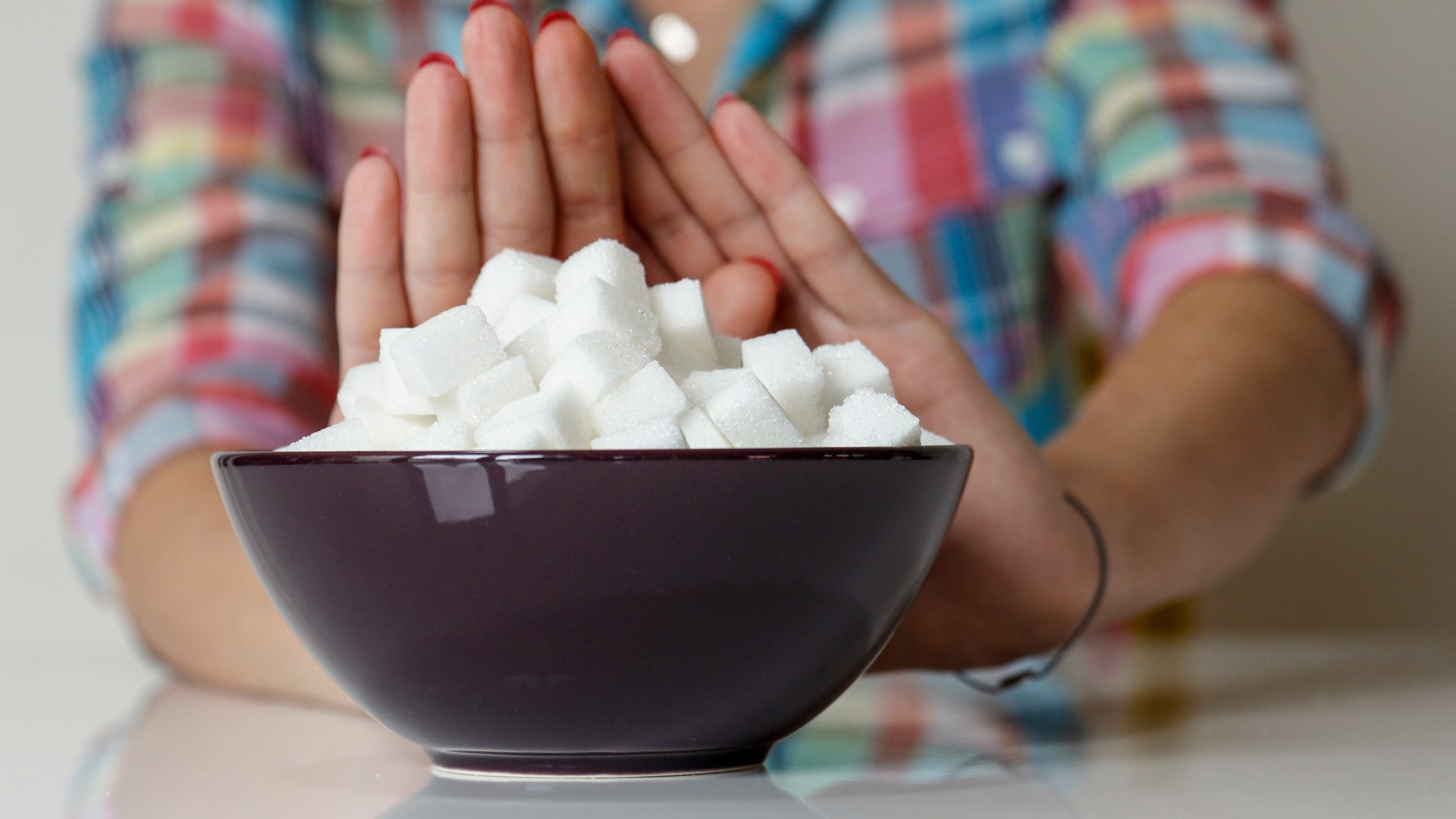'I gave up sugar for 7 days and this is what happened'
Our writer gave up the sweet stuff for one week and noticed a few changes...


Start your week with achievable workout ideas, health tips and wellbeing advice in your inbox.
You are now subscribed
Your newsletter sign-up was successful
Anyone who's given any thought to how to eat healthily will no doubt be familiar with the need to reduce our consumption of sugar - and I'm no different, which is why I chose to give up sugar for seven days.
The sweet stuff has been linked to a wealth of health issues, with excessive consumption leading to weight gain, which in turn increases our risk of diabetes, heart disease and some cancers.
Despite that, we're still eating shedloads of it. The 2015-2020 Dietary Guidelines for Americans states that the average American eats around 17 teaspoons of sugar a day, whilst Brits eat an average of 700g of sugar a week.
These figures exceed government guidelines by some margin. In the US, adults are advised to get no more than 10% of their daily calories from sugar. Meanwhile in the UK, the NHS recommends adults consume no more than 30g of 'free sugars' a day.
These free sugars are sugars that are added to foods - whether by the manufacturer or ourselves - plus those naturally present in honey, syrups and unsweetened fruit juice. However milk and milk products containing lactose - a natural sugar found in dairy foods - are excluded, as are the sugars in whole fruit.
For perspective, a 36g Mars Bar contains 20.8g of sugar - so it's easy to see just how quickly you can hit your daily quota - and tip over the edge.
However, added sugars aren’t just in sweets, chocolate and cakes. They’re everywhere. A 30g bowl of muesli can contain up to about 12g of sugar, whilst just one tablespoon of ketchup contains around 3.7g of sugar.
Start your week with achievable workout ideas, health tips and wellbeing advice in your inbox.
Armed with this information, I realized the extent of the so-called 'hidden sugars' in my diet - which spurred me on in my quest to give up the sweet stuff for a week.
Giving up sugar for 7 days: the rules
Although I’m not the type to wake up and crave sugar-laden pastries, sugar is my energy-giver. It’s my 11am pit stop, keeps me going come 3pm, and after dinner I can't resist the call of my chocolate box. Oh, and in a classic case of single-female-syndrome, I'm in a long-term relationship with Ben and Jerry’s.
With this in mind, I figured giving it up for seven days would do me good.
The rules were simple: any form of added sugar needed to go. This wasn’t just the obvious foods like sweets, chocolate and cakes, but also the sugar in granola, protein bars and condiments. Plus, any of my plant-based milks with added sugar - yup, they were gone too.
I went into the week with a mix of excitement and trepidation. How would giving up sugar impact me? Would it be hard? How would I feel? If you're wondering the same, read on to find out what happened when I gave up sugar for seven days...
My digestion improved
For me, this was the most interesting factor in giving up sugar. As someone who is very in tune with their bowel movements, I notice even the slightest of changes in my digestion. And this week, things just moved smoothly.
How so? Essentially, foods with added sugar are not contributing positively to our gut’s microbiome - the collection of good and bacteria.
‘A diet high in sugar may upset the balance of bacteria in the gut and this could cause bloating,’ explains nutritionist Rob Hobson.
‘Ditching sugar and eating foods rich in good bacteria and fibre may help to relieve bloating which would make clothes feel more comfortable. Making these dietary changes will of course also help to improve overall gut health which is key to good digestion.’
However, it's a chicken-and-egg situation. As a result of quitting sugar, I generally ate healthier foods rich in fibre and other nutrients to support the gut and my digestion - so a digestive win-win all round.
My jeans felt looser
OK, so one week isn’t going to be enough to make a noticeable difference to your weight. However, with smoother digestion came a flatter tummy and definitely a sense of feeling slimmer.
‘Cutting out a daily chocolate bar, fizzy drink and sugar in your tea or coffee alongside choosing other foods low in sugar could easily knock 400 to 500 calories off your daily intake, which will help with weight loss,’ says Rob.
I’m not a huge calorie counter these days (I find it can get quite addictive but that’s a story for another day), however I was intrigued - and a little shocked - to discover the calories in my favorite go-to afternoon sweet treats.
Lindt Excellence 70% Cocoa Chocolate is my regular go-to. However, when I worked out that one square contains 56 calories and 2.9g of sugar. That doesn't sounds much, but who ever stops at one square? Certainly not me. So it definitely made me think about the calories and sugar I was consuming via sugary treats.
I slept like a baby
After just two days of no sugar, I found myself falling asleep within minutes of getting into bed - plus I didn't wake up in the night.
Then on day eight, when sugar was allowed back into my life, I had some chocolate before bed and the difference in my sleep quality was noticeable; I woke up twice in the night and just didn’t feel as refreshed in the morning.
I asked Rob if there was a connection.
‘Yes, sugar could impact on your sleep, and research has shown how an excess of sugar could pull you out of deep sleep.’
In fact, a 2016 study found that those who had high sugar diets slept less deeply and were more restless at night. Sugar is essentially a stimulant, so eating it before bed - much like caffeine - could cause problems when you’re trying to rest your body.
I also found that those dreaded mid-afternoon slumps disappeared, which Rob attributes to not having high-sugar foods at lunchtime.
Rob explains: ‘According to research by Cambridge University, sugar reduces the activity of orexin cells. These cells stimulate parts of the brain that produce hormones such as norepinephrine, which help to keep us aroused and physically mobile.'
By contrast, he adds: 'Interestingly it has also been shown that amino acids (protein) not only stimulate these orexin cells, but prevent glucose from inhibiting their function. So to keep you wide awake in the afternoon and to avoid the desire to nap you should opt for a high protein and low carb lunch.’
I got more spots
This one baffled me. Over the course of my sugar ‘detox’, my skin just erupted. I mean, it could have been PMS or my choice of skin care but it did seem a little odd.
I thought no sugar would mean no spots - right?
However, Rob explains that there isn’t actually any evidence to suggest that sugar in the diet directly causes spots.
‘It may be that people who eat a lot of sugar have a worse diet overall, leaving them lacking in nutrients that support good skin health, but this doesn’t necessarily equate to getting spots.
'Spots or acne are normally the result of hormones, which can cause an overproduction of sebum blocking the pores which then get colonized by bacteria, causing inflammation and pustules.’
He adds that women are more prone to spots, especially women with polycystic ovary syndrome (PCOS), who are the most likely candidates for adult acne.
'This is due to excess testosterone,' he says. Insulin resistance is thought to be a key factor in PCOS and a low GI diet is highly recommended.
'For women with PCOS, ditching sugar is a no-brainer alongside eating a diet rich in whole foods that have less impact on blood glucose levels.’
Lucy is a freelance journalist specializing in health, fitness and lifestyle. She was previously the Health and Fitness Editor across various women's magazines, including Woman&Home, Woman and Woman’s Own as well as Editor of Feel Good You. She has also previously written for titles including Now, Look, Cosmopolitan, GQ, Red and The Sun.
She lives and breathes all things fitness; working out every morning with a mix of running, weights, boxing and long walks. Lucy is a Level 3 personal trainer and teaches classes at various London studios. Plus, she's pre- and post-natal trained and helps new mums get back into fitness after the birth of their baby. Lucy claims that good sleep, plenty of food and a healthy gut (seriously, it's an obsession) are the key to maintaining energy and exercising efficiently. Saying this, she's partial to many classes of champagne and tequila on the rocks whilst out with her friends.
